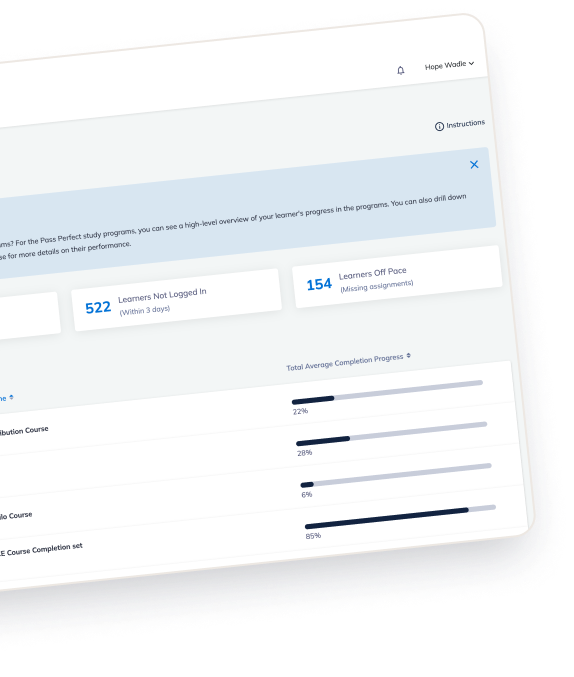01/ 04
Join the millions who’ve passed the first time.
Instructor Ranking
4.8/5
Pass Perfect’s live class instructor ranking in 2024.
CSAT Support Rep Ranking
4.6/5
Pass Perfect’s customer satisfaction ranking in 2024
Popular Courses
SIE + Series 7
Prices starting at
$
229
00
SIE
Prices starting at
$
99
00
Series 7
Prices starting at
$
199
00
Series 65
Prices starting at
$
199
00
Series 63
Prices starting at
$
99
00
Series 66
Prices starting at
$
155
00
Series 24
Prices starting at
$
375
00
Preparing Passers for Over 40 Years
A proven past, exciting present, and promising future — all driven by a team of people proud to help others reach their career goals.
Pass Perfect Features
State-of-the-art Learning Management System
No other securities exam preparation is backed by the experience and resources of Pass Perfect. With the most up-to-date content, delivered in ways that best work for you, you will join the millions we’ve helped get licensed.
50k+
Passers this year
Proficiency Dashboard
A user-friendly dashboard that provides high level performance data that puts you in control so you know exactly where you are, what’s coming next, and where you need to focus.
Question Database
With 3x more questions than competitors, Pass Perfect is the only online interactive securities prep to help you learn it all.
Chapter, Mastery, and Final Comprehensive Exams
Knowledge tests at the end of each milestone, and (unlike many competitors) you can take them an unlimited number of times.
Calendar Customizations
The study plan makes for a smooth learning experience from start to finish. Providing a daily schedule of study recommendations, it organizes tasks across the calendar.
Check Your Understanding
Practice questions after each section to show whether you grasp the material or not, and recommend next steps.
Comprehensive Study Guide
Comprehensive online and eBook study guides for you to help organize your learning goals.

Study Smarter, Pass Faster
Launched in early 2024, these latest enhancements to the Pass Perfect learning management system bring even more value to our learners.
Reimagined Content
We’ve optimized our courses to reduce study time and boost pass rates for faster licensing. In Series 66, we’ve cut the fluff for 36% faster overall study time, and cut reading time by 25% in Series 7!
Proficiency Dashboard
See at a glance where you’re doing well, or where you need a little extra work. The new dashboard puts you in control so you know where you are and where you need to focus.


Partnerships
Corporations
We’ve pushed the boundaries of traditional learning with an innovative learning experience designed to support learning and development leaders and corporate administrators in their goals to help your employees gain the highest quality financial education anywhere.

Partnerships
Universities
Our SIE programs not only adapt to each learner’s individual needs, but can also be customized for your university’s overall needs. Whether you want to launch an entirely new program or just simplify a current one, we’re here to help create your perfect solution.
What everyone is saying...
Year after year, Pass Perfect receives high customer satisfaction ratings. We value the confidence our clients have in us and we will never stop working towards tomorrow’s solutions — because our future is all about helping you prepare for yours.
I HIGHLY recommend Pass Perfect! I didn’t come from a finance background and passed the SIE, Series 6, and 63 first try using Pass Perfect. One of things I love about it compared to other learning programs is the various resources it provides. The program caters to different learning styles and I wouldn’t have been as successful without all the many practice tests it provides. Utilize all the resources and you will pass for sure!
Rebecca
February 2024
Very happy with my pass perfect experience. I thought the test prep prepared me for the exam, in fact maybe slightly more difficult. Peter was particularly helpful, as he was available for one-on-one tutoring, focusing on areas I felt I needed to strengthen. Happy to be done and very appreciative for the guidance through the process!
Ryan Baker
March 2024
Pass Perfect is well….. Perfect! Very informative and to the point. It is great preparation for the career road ahead.
Noah Polvado
April 2024
Easy to follow to material. The system tracks your proficiency so that help you to know what items you need to work on more. Instructor very patient and answered all questions. Was thoroughly with all the material.
Stephanie Mays
March 2024
I cannot recommend Pass Perfect / their Training program enough. I studied for the S-10 and failed my first attempt while using STC! I switched to Pass Perfect for my 2nd attempt and I PASSED - All because of the way this program is built out. The videos, the classes, the QUICK BOOKS, all of it! This program challenges you more than any other program in the game. The tutor’s are also super helpful and really cross your t’s and dot your i’s. 10/10 recommend this program for your Series 10!
Kara McDade
May 2024
Pass Perfect has been the ideal partner for our firm. The study materials for different FINRA licenses have been expansive and helped our reps complete their requirements and pass their exams.
Anonymous
B2B Customer



